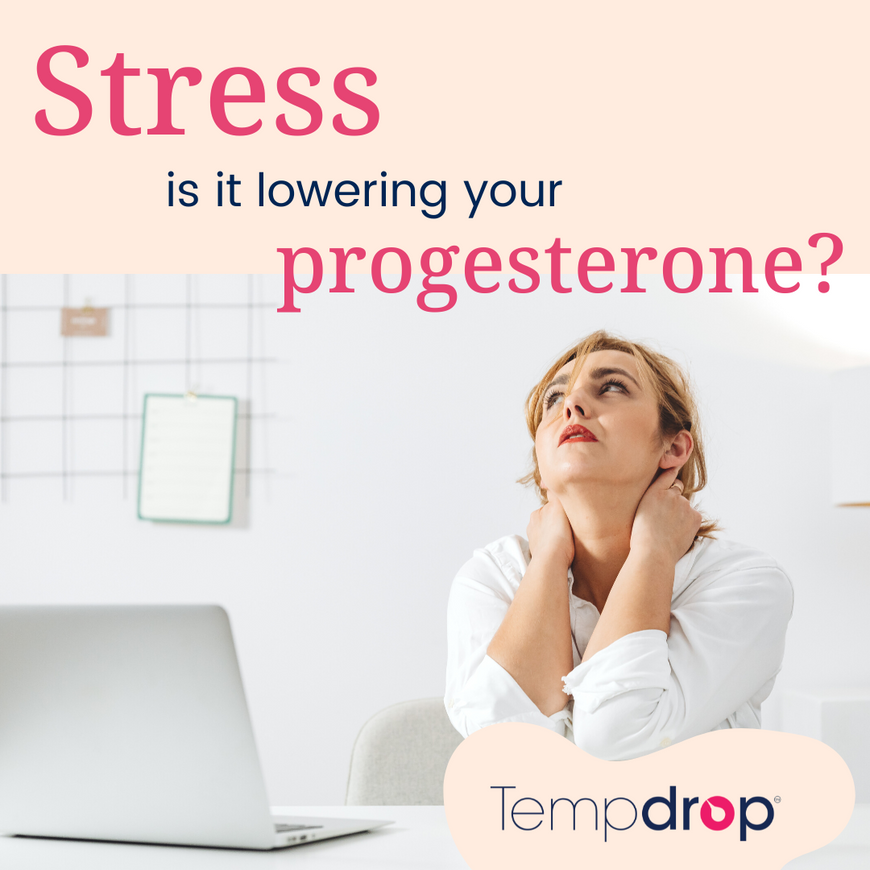Written by Meg Langston
Do you have low progesterone?
Low progesterone can show up in a number of ways, including feeling anxious, spotting, and a 10 day or less luteal phase. So could stress be a key factor in the cause of your low progesterone?
How?
The stress hormone, cortisol, is released by the body whenever there is a sympathetic or fight or flight response to a situation. This can be from trauma, food sensitivities, too much estrogen in the body, under-sleeping, over-exercising, and more.

Both estrogen and progesterone hormones are bound in the plasma to specific binding protein. Progesterone, specifically, attaches to a cortisol binding globulin. Cortisol is your stress response hormone and is produced at higher levels when your body is in a sympathetic state.
A dip or change in progesterone greatly impacts your cycle, thyroid, metabolism, and overall health as a result.
Any of this sound familiar? Here are three simple diet practices to help raise your progesterone!
1). Eat enough carbohydrates in your diet.

This can look like getting carbohydrates in the form of potatoes, fruit, root vegetables, and high quality sugars like honey and maple syrup.
When you do not have enough carbohydrates in your body, your blood sugar drops and cortisol and adrenaline are released to raise blood sugar and protect vital functions. The progesterone receptors will not transport molecules of progesterone because adrenaline stops this action in a cell’s nucleus. As a result, you do not get the benefits of progesterone (the hormone normally travels to the nuclei and is metabolized). So eat your carbs!
2). Incorporate saturated fat into your cooking.
Eating enough saturated fat matters as it’s the backbone of your sex hormones, including progesterone! Adding butter, ghee, lard, or coconut oil to your
cooking is an easy way to make sure you’re getting the benefits and their integral role in hormone production. An added plus is that your cooking automatically tastes better!
3). Raw carrot salads are your friend.

Excess estrogen can greatly impact progesterone levels. A simple way to reduce estrogen is to make sure you’re going to the bathroom every day and carrots are incredibly helpful if you suffer from constipation. Carrots are a root vegetable that contain unique fibers that attach themselves to endotoxins, bacteria, and estrogen. Your liver works to remove these endotoxins, bacteria, and excess estrogen daily by detoxing them into your gut for final elimination. This is where the carrot fibers play an integral role by being able to pick up these stressors in the gut and escort them out.
Supporting Progesterone Production
Diet on point? Here are a few lifestyle suggestions to support optimal progesterone production:
● Take breaks and REST!
● Get outside and in the sun! Sunlight can be incredibly healing in small increments.
● Feed your cells with Red Light Therapy. Your mitochondria will thank you by being more energy efficient.
● Laugh and have fun!
● Surround yourself with community. It will uplift your spirits and provide support.
● Sleep! Giving your body a chance to repair is so important.
● Serve others! By serving others you serve yourself.
Meg Langston is a Nutritional Therapy Practitioner who works with women to help regulate hormones/period health, educate on the Gut- Brain connection, and help find a root cause(s) solution to digestive issues. It was through working on her hormones that she found holistic health and learned how much food can support and heal the body. The knowledge she has learned through experience and school helped her gain a new outlook on defining beauty. She deeply believes that the body talks back in symptoms and through the menstrual cycle. The goal she strives to achieve with each of her clients is to help them become body literate and achieve long-lasting health by getting to root cause solutions and education.

